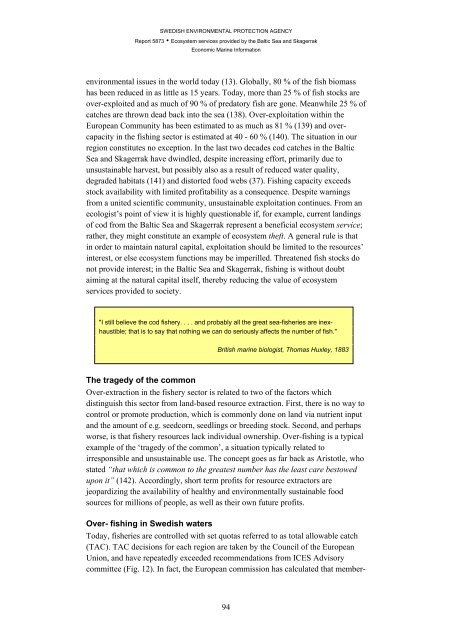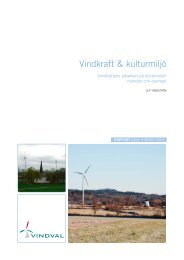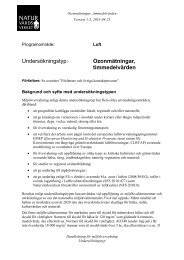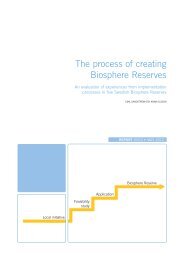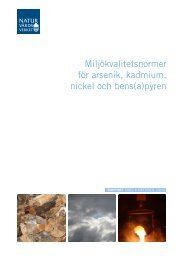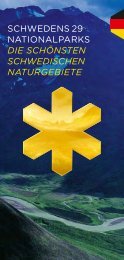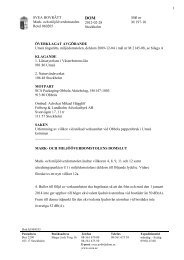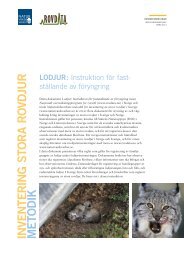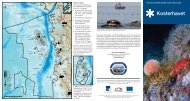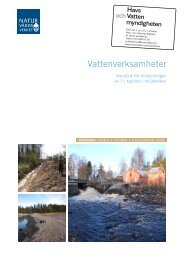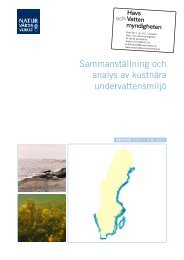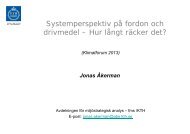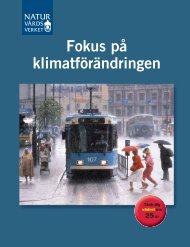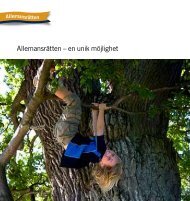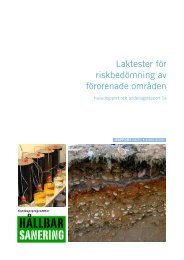Ecosystem services provided by the Baltic Sea ... - Naturvårdsverket
Ecosystem services provided by the Baltic Sea ... - Naturvårdsverket
Ecosystem services provided by the Baltic Sea ... - Naturvårdsverket
You also want an ePaper? Increase the reach of your titles
YUMPU automatically turns print PDFs into web optimized ePapers that Google loves.
SWEDISH ENVIRONMENTAL PROTECTION AGENCY<br />
Report 5873 • <strong>Ecosystem</strong> <strong>services</strong> <strong>provided</strong> <strong>by</strong> <strong>the</strong> <strong>Baltic</strong> <strong>Sea</strong> and Skagerrak<br />
Economic Marine Information<br />
environmental issues in <strong>the</strong> world today (13). Globally, 80 % of <strong>the</strong> fish biomass<br />
has been reduced in as little as 15 years. Today, more than 25 % of fish stocks are<br />
over-exploited and as much of 90 % of predatory fish are gone. Meanwhile 25 % of<br />
catches are thrown dead back into <strong>the</strong> sea (138). Over-exploitation within <strong>the</strong><br />
European Community has been estimated to as much as 81 % (139) and overcapacity<br />
in <strong>the</strong> fishing sector is estimated at 40 - 60 % (140). The situation in our<br />
region constitutes no exception. In <strong>the</strong> last two decades cod catches in <strong>the</strong> <strong>Baltic</strong><br />
<strong>Sea</strong> and Skagerrak have dwindled, despite increasing effort, primarily due to<br />
unsustainable harvest, but possibly also as a result of reduced water quality,<br />
degraded habitats (141) and distorted food webs (37). Fishing capacity exceeds<br />
stock availability with limited profitability as a consequence. Despite warnings<br />
from a united scientific community, unsustainable exploitation continues. From an<br />
ecologist’s point of view it is highly questionable if, for example, current landings<br />
of cod from <strong>the</strong> <strong>Baltic</strong> <strong>Sea</strong> and Skagerrak represent a beneficial ecosystem service;<br />
ra<strong>the</strong>r, <strong>the</strong>y might constitute an example of ecosystem <strong>the</strong>ft. A general rule is that<br />
in order to maintain natural capital, exploitation should be limited to <strong>the</strong> resources’<br />
interest, or else ecosystem functions may be imperilled. Threatened fish stocks do<br />
not provide interest; in <strong>the</strong> <strong>Baltic</strong> <strong>Sea</strong> and Skagerrak, fishing is without doubt<br />
aiming at <strong>the</strong> natural capital itself, <strong>the</strong>re<strong>by</strong> reducing <strong>the</strong> value of ecosystem<br />
<strong>services</strong> <strong>provided</strong> to society.<br />
"I still believe <strong>the</strong> cod fishery. . . . and probably all <strong>the</strong> great sea-fisheries are inexhaustible;<br />
that is to say that nothing we can do seriously affects <strong>the</strong> number of fish."<br />
British marine biologist, Thomas Huxley, 1883<br />
The tragedy of <strong>the</strong> common<br />
Over-extraction in <strong>the</strong> fishery sector is related to two of <strong>the</strong> factors which<br />
distinguish this sector from land-based resource extraction. First, <strong>the</strong>re is no way to<br />
control or promote production, which is commonly done on land via nutrient input<br />
and <strong>the</strong> amount of e.g. seedcorn, seedlings or breeding stock. Second, and perhaps<br />
worse, is that fishery resources lack individual ownership. Over-fishing is a typical<br />
example of <strong>the</strong> ‘tragedy of <strong>the</strong> common’, a situation typically related to<br />
irresponsible and unsustainable use. The concept goes as far back as Aristotle, who<br />
stated “that which is common to <strong>the</strong> greatest number has <strong>the</strong> least care bestowed<br />
upon it” (142). Accordingly, short term profits for resource extractors are<br />
jeopardizing <strong>the</strong> availability of healthy and environmentally sustainable food<br />
sources for millions of people, as well as <strong>the</strong>ir own future profits.<br />
Over- fishing in Swedish waters<br />
Today, fisheries are controlled with set quotas referred to as total allowable catch<br />
(TAC). TAC decisions for each region are taken <strong>by</strong> <strong>the</strong> Council of <strong>the</strong> European<br />
Union, and have repeatedly exceeded recommendations from ICES Advisory<br />
committee (Fig. 12). In fact, <strong>the</strong> European commission has calculated that member-<br />
94


